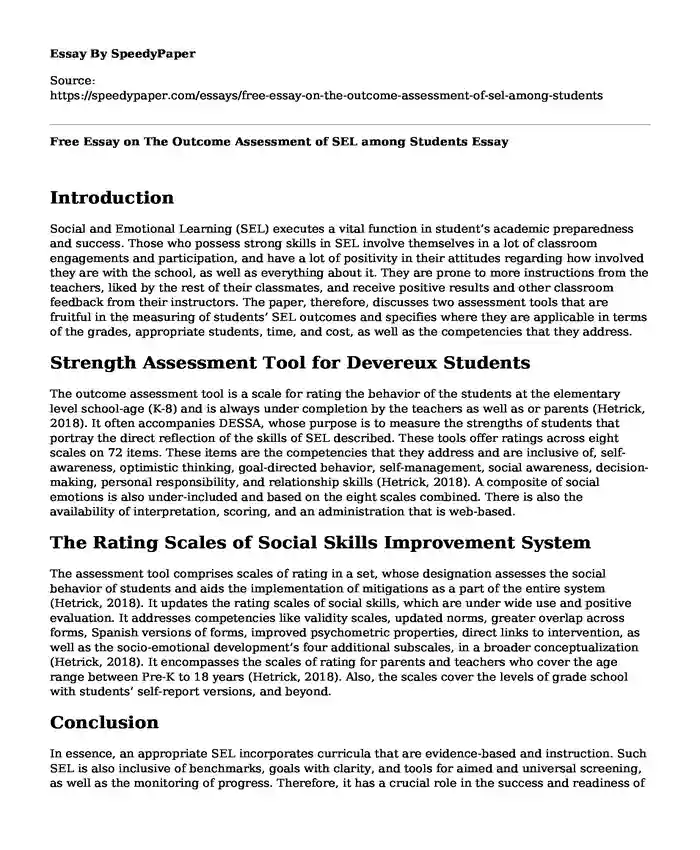
| Type of paper: | Essay |
| Categories: | Learning Students Emotional intelligence |
| Pages: | 2 |
| Wordcount: | 468 words |
Introduction
Social and Emotional Learning (SEL) executes a vital function in student’s academic preparedness and success. Those who possess strong skills in SEL involve themselves in a lot of classroom engagements and participation, and have a lot of positivity in their attitudes regarding how involved they are with the school, as well as everything about it. They are prone to more instructions from the teachers, liked by the rest of their classmates, and receive positive results and other classroom feedback from their instructors. The paper, therefore, discusses two assessment tools that are fruitful in the measuring of students’ SEL outcomes and specifies where they are applicable in terms of the grades, appropriate students, time, and cost, as well as the competencies that they address.
Strength Assessment Tool for Devereux Students
The outcome assessment tool is a scale for rating the behavior of the students at the elementary level school-age (K-8) and is always under completion by the teachers as well as or parents (Hetrick, 2018). It often accompanies DESSA, whose purpose is to measure the strengths of students that portray the direct reflection of the skills of SEL described. These tools offer ratings across eight scales on 72 items. These items are the competencies that they address and are inclusive of, self-awareness, optimistic thinking, goal-directed behavior, self-management, social awareness, decision-making, personal responsibility, and relationship skills (Hetrick, 2018). A composite of social emotions is also under-included and based on the eight scales combined. There is also the availability of interpretation, scoring, and an administration that is web-based.
The Rating Scales of Social Skills Improvement System
The assessment tool comprises scales of rating in a set, whose designation assesses the social behavior of students and aids the implementation of mitigations as a part of the entire system (Hetrick, 2018). It updates the rating scales of social skills, which are under wide use and positive evaluation. It addresses competencies like validity scales, updated norms, greater overlap across forms, Spanish versions of forms, improved psychometric properties, direct links to intervention, as well as the socio-emotional development’s four additional subscales, in a broader conceptualization (Hetrick, 2018). It encompasses the scales of rating for parents and teachers who cover the age range between Pre-K to 18 years (Hetrick, 2018). Also, the scales cover the levels of grade school with students’ self-report versions, and beyond.
Conclusion
In essence, an appropriate SEL incorporates curricula that are evidence-based and instruction. Such SEL is also inclusive of benchmarks, goals with clarity, and tools for aimed and universal screening, as well as the monitoring of progress. Therefore, it has a crucial role in the success and readiness of students.
Reference
Hetrick, M. R. (2018). Universal Implications for the Effects of Strong Kids Social and Emotional Learning Curriculum on Students’ Social-Emotional Competence: A Quantitative Analysis. https://www.edutopia.org/blog/tools-assess-sel-in-schools-susanne-a-denham
Cite this page
Free Essay on The Outcome Assessment of SEL among Students. (2023, Dec 04). Retrieved from https://speedypaper.com/essays/free-essay-on-the-outcome-assessment-of-sel-among-students
Request Removal
If you are the original author of this essay and no longer wish to have it published on the SpeedyPaper website, please click below to request its removal:
- Essay Example on Asian Pacific American Early Pioneers - Sojourners or Settlers
- Individualised Learning Plan, Free Paper Example
- Essay Sample on Why Should Christians Study Secular Literature Discussion
- Essay Sample on Civil Rights Movement and Its Effects
- Truancy, Graffiti, Robbery. Free Essay Sample
- Free Paper Example: The Role of Psychology in International Relations
- Navigating Male Eating Disorders: Unveiling the Transformative Power of Gender-Sensitive Interventions
Popular categories




